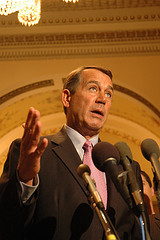
With the midterm elections now more than two weeks behind us and (almost) every race decided, it is time to look ahead and see what the next two years have in store.
The final results, as expected, favored the Republican party. With five races still undecided, the Republicans picked up sixty-one seats in the House to regain the majority by a healthy margin. Republicans also picked up six seats in the Senate, but Democrats retained a fifty-three-seat majority. With Republicans securing a majority in the House of Representatives, John Boehner, the perpetually tanned congressman from Ohio, will likely replace current Speaker of the House Nancy Pelosi.
Boehner has already been making changes to Republican leadership teams in order to accommodate the unusually large number of freshman Congressmen. A third of the Republicans in the House in the next session will be newcomers to Washington. As reported by the New York Times, Boehner will add a seat to the leadership team and three seats to the Republican Steering Committee – the body that makes committee assignments – specifically for freshman.
Boehner’s choice to add leadership positions could be as simple as a gesture of inclusion for the large freshman class, but it also seems possible that it is an attempt to appease Tea Party leaders. The Tea Party played a large role in these elections, riding a wave of discontent to victory. While some prominent Tea Party-backed candidates failed to get elected (namely, Christine O’Donnell) the Tea Party was a huge fundraising boon for Republicans in general. Now the Tea Party is hoping to translate its modest electoral successes into serious legislative power, but this quest will not be without struggles.
Republican leader Karl Rove said in an interview with German magazine Der Spiegel that the Tea Party was “not sophisticated” and hinted that he thought the average tea partier was uneducated. The Wall Street Journal reports that in the marathon orientation for freshman congressman, the Tea Party Patriots were angered when their event was double booked with that of the Claremont Institute, forcing congressmen to choose which to attend. The Tea Party Patriots sent out an e-mail that accused the Republican party of trying to “push the Tea Party aside”.
Despite these accusations, the Republican establishment has done more than just add leadership positions in an effort to mollify the Tea Party. The lame duck session of Congress opened with Republicans in the senate declaring their desire to end earmarks, a key campaign goal of tea partiers. At this point, it is clear that there are divisions in the Republican party, but it is not yet clear how important those divisions will be. The one thing everyone can agree on is unwillingness to work with Democrats.
With each party in control of one house of Congress, it will be essential for some compromises to be made in order for any business to be accomplished. Neither party has the coveted filibuster-proof majority (sixty votes) that is increasingly necessary in the Senate. In the lead-up to the elections, various Republican candidates pledged not to compromise with their Democratic colleagues in Congress, but since the elections have ended and the actual act of governing is becoming more imminent, that rhetoric has become less widespread.
Democrats have had little to do but wait for the new congress to start. After early talk of potential challengers to Nancy Pelosi’s leadership, she has officially secured her position as Minority Leader of the House. Harry Reid will keep his position as Senate Majority Leader. Democrats have suggested that they are open to compromise with Republicans, and Barack Obama invited Republican leaders to meet with him at the White House.
All of this means nothing, of course, until the 112th Congress meets this January and the governing starts. It seems likely that Republicans will vilify Democrats in general and President Obama in particular, but just as likely that Democrats will drag their feet on compromises and filibuster to block votes in the Senate. Eventually lawmakers will be forced to work together, like it or not. After all, they have a country to run.

One Comment on “Introducing: The 112th Congress of the United States”